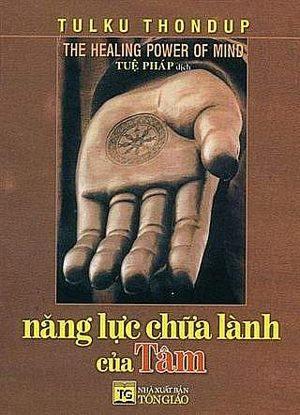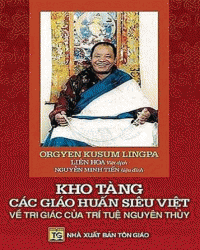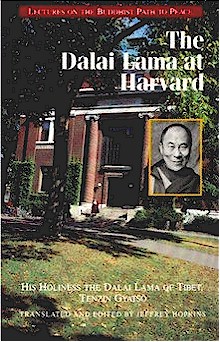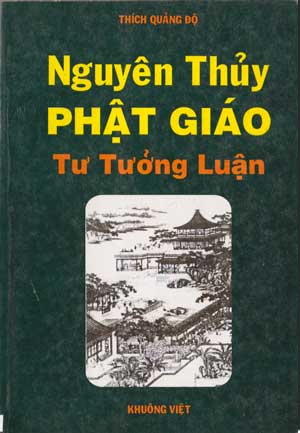REFUGE AND THE SIX PERFECTIONS
Thích Huệ Hải - Xem bản tiếng Việt
Today's talk is based on the teachings of the 9th century Indian Buddhist master Shantideva and the text he wrote, “The Way of the Bodhisattva.” I will begin by talking about refuge, which is the first step on the path to Buddhahood, and then I will discuss the six perfections of generosity, morality, patience, effort, concentration and finally wisdom.
As I just said, the beginning of Buddhist practice is refuge. This means one goes for refuge in the Buddha as one's teacher, the Dharma, which is his teaching and the Sangha, which is the community of enlightened disciples of the Buddha. In English, sometimes this last term, Sangha, can become confusing. Traditionally, the term Sangha can refer to the the Third Jewel of the Buddha's enlightened disciples or it can refer to the community of monks and nuns. However, in American Dharma Centers it is generally used to describe the community of the Dharma center, whether or not any monks or nuns are part of that community. We are not going for refuge in our friends at the Dharma center, though, as by definition going for refuge in non-enlightened beings is not Buddhist refuge. To non-Buddhists, who in America are mostly Christian, we can simply call refuge “Buddhist baptism.”
First, refuge is the doorway to the Dharma--the Buddha's teaching or explanation of reality. If you want to go on a vacation to Hawaii or to France you might do some reading first about what you can do when you get there and how wonderful it will be there. You might even buy some maps and new luggage for the trip, and check out the cost of a ticket to go. But if you don't actually get on the plane, you'll never get there. Going for refuge is like getting on the plane.
Second, refuge is the basis for all other precepts and vows. Just as you can't put on robes and call yourself a monk or nun without taking the vows, you can't take Buddhist monastic vows without first going for refuge. You also can't take the bodhisattva vow-- the vow to achieve enlightenment for the benefit of all sentient beings--without first going for refuge.
Third, it is the source of virtuous qualities because the Buddhas and bodhisattvas have perfect, virtuous qualities. By going for refuge we have set ourselves on the path to developing those same virtuous qualities.
Finally, it is what distinguishes Buddhists from non-Buddhists. Having gone for refuge is the minimum requirement to call oneself a Buddhist. If I go to Vietnam and simply say I'm a Vietnamese citizen and ask for a passport, the government won't give me one, will they? Of course not! First I have to go through the process of becoming a citizen. Refuge is therefore what makes one an official Buddhist.
The cause of going for refuge is confident faith, one of three kinds of faith. The first kind of faith is called vivid faith or admiring faith in which we are deeply impressed by the qualities of the Buddha and his disciples, the hardships they endured and perhaps the miracles they performed. However, if we look at something from afar and think that it is good or nice or whatever, but we don't actually follow through with pursuing whatever it is that we admire, that admiration doesn't serve any purpose. There is no benefit to simply admiring the Buddha and his disciples. A lot of people in the West have a very good impression of the Buddha and Buddhists, but they don't go for refuge and take up Buddhist practice. They could be said to have admiring faith. Of course, someone with admiring faith might take refuge and become Buddhist, but then they wouldn't follow through and actually practice or learn the Dharma.
Next there is longing faith or yearning faith. This faith is defined by the wish that if we practice the Dharma then in the future we too will achieve great wisdom and be like the bodhisattvas whose stories we hear. We might also hear of the wonderful qualities of Sukhavati, Amitabha Buddha's Pure Land, and wish to be reborn there. This is also yearning faith.
Finally, there is confident faith or trusting faith. This faith develops over time as we learn more of the Dharma. This is a faith in which we see that the Buddha and his teaching are something virtuous and worthwhile to the extent that we want to learn it and put it into practice. It is a faith based in knowing something of the Dharma and seeing that it is true and useful. It is not blind faith in which we believe without thinking about what we have learned or in which we believe something simply because we need something to believe in. It is this last faith - confident faith - that leads us to formally become Buddhist by going for refuge. But it also leads us to follow-up by learning the Dharma and working to put in into practice after having formally gone for refuge.
There is actually a fourth kind of faith called irreversible faith in which we continue with the Dharma no matter what obstacles come our way. However, this last kind of faith can be subsumed under confident faith.
The essence of going for refuge is the recognition that the Buddha, Dharma and Sangha are in fact objects worthy of veneration and respect, and that by going for refuge in them one can achieve the end of suffering and ultimately become a perfectly enlightened Buddha for the benefit of all sentient beings. Refuge means that we go to the Three Jewels as the source of protection against suffering. The Buddha and the Sangha can't magically take away our ignorance, the source of suffering. Instead, the Buddha and his enlightened disciples which we call the Sangha give refuge to ignorant beings by teaching the Dharma.
As you have heard many times, we all have the Buddha nature within us (our true nature) which is no different from a perfectly enlightened buddha. The practice of the Dharma is simply to reveal that Buddha nature. It is the perfect expression of wisdom and compassion. By uncovering our Buddha nature we overcome our ignorance and end the dissatisfaction and suffering we experience in the cycle of birth, old age, sickness and death.
There are also two kinds of going or refuge. The first is called Temporary Causal Refuge in which we go for refuge in the Three Jewels as outer objects of refuge. Then there is Ultimate Resultant Refuge in which we go for refuge in the Three Jewels as representatives of our future self because we are fully committed to awakening and becoming a perfect Buddha ourselves. The first kind of refuge is one in which we don't have confidence in our Buddha nature and so we look outside ourselves for aid and comfort. However, it is temporary because it should eventually give way to the second kind of refuge in which we do have confidence in our Buddha nature and in which we have truly committed ourselves to achieving enlightenment. It is causal because it causes us to pursue the Dharma and thus leads us to Ultimate Resultant Refuge. Ultimate Resultant Refuge is ultimate because there is nothing beyond this kind of refuge. It is resultant because it is refuge in the result of pursuing the path taught by the Buddha which is our own buddhahood and because it leads to that result.
Being Buddhist means one also has renunciation. This renunciation arises from an understanding that attachment to the temporary pleasures of samsara cannot bring real happiness. The ultimate, perfect, complete, lasting happiness cannot be found in temporary things. In fact, such attachment causes suffering because our effort to be happy constantly fails. We try to fill ourselves up with entertainment, money, and so on, but the happiness these things bring, if they bring any happiness at all, is only temporary. As for material wealth, if we have it we worry about losing it and finding that what we have isn't enough to overcome our dissatisfaction we generally feel like we need more. We are like drug addicts, constantly sticking the needle in our arms in the futile attempt to overcome dissatisfaction and suffering with the very things that cause dissatisfaction and suffering. Except our addictions are more socially acceptable than an actual drug abuser's addictions. Renunciation is seeing this foolishness and also being exhausted with suffering so that we will instead turn our minds away from the causes of suffering and toward the Dharma.
Now...a pratyekkabuddha or sravaka (a self-realized buddha or a “hearer”--practitioners on the path of individual liberation) would go no further than renunciation. However, renunciation of samsara isn't enough on the Mahayana path. One also needs to cultivate great compassion--the understanding that beings are suffering and the strong feeling that we need to do something about it. So renunciation is characterized by not wanting suffering for oneself, but compassion is not wanting others to suffer either.
There are both special and common trainings for those who have taken refuge. As for the common trainings, the first is to not turn one's back on the Three Jewels even if offered a gift or if one's life is threatened. If someone says, “I'll give you a million dollars to give up the Dharma,” or, “If you don't renounce the Buddha, Dharma and Sangha, I'll kill you,” we should be prepared to say, “No.” A million dollars cannot compare to the joy of enlightenment. As for death, if we die unenlightened we will simply be reborn again and if we do achieve enlightenment then we will not be forced through the power of our karma to continue spinning in the cycle of birth, old age, sickness and death. So, there is no benefit to renouncing the Three Jewels if we are threatened. By continuing to turn our minds toward the Three Jewels, we will eventually awaken our inner Buddha nature and then no harm can come to us at all.
Another of the common trainings is not to fail to make offerings to the Three Jewels. We should at the very least make mental offerings to the Three Jewels daily. Also, every time we acquire something new, we should first offer it to the Three Jewels before using it ourselves. This is an easy way to accrue merit.
We should also continue to study and practice the Dharma so as to strengthen our refuge. Refuge isn't something we do once and then forget about. If we have gone for refuge, then we must commit ourselves to really changing our minds--to turning away from mental states that lead us and others toward suffering. Instead, we must cultivate positive mental states such as compassion and loving-kindness. This will help us and others suffer less now and will lead us to enlightenment. As enlightened beings we will be able to aid others even more.
We should also encourage others who have an interest in the Dharma to pursue it, but without being pushy. If our faith depends upon others being convinced that our beliefs are right, then we have a weak faith. People who harass others or threaten them with hellfire for not believing in the same things are really trying to convince themselves that their own beliefs are true. It's insecurity, not faith that leads some people to act this way.
Also, it is said that wherever we go, we should prostate to the Buddha of that direction. Of course, we can't walk around all the time physically prostrating. It would be even more difficult to prostrate while driving. But within our minds we can maintain an attitude of respect and veneration for the all the Buddhas.
The special trainings are more extensive. The first three relate to what is prohibited. So first, having taken refuge in the Buddha, we should not take permanent refuge in any being other than an enlightened being. Praying to an earth spirit, for example, as a permanent refuge goes against refuge in the Buddha. However, many cultures believe in nature spirits and ask their permission before clearing land or building something and that's fine. vSecond, having taken refuge in the Dharma, we should try to not harm beings and in fact we should try to protect them all we can. Instead of killing a spider, it's a simple thing to catch it and put it outside.
Finally, having taken refuge in the Sangha, we shouldn't associate with those who speak ill of the Dharma or of our teacher. In my personal opinion, if someone doesn't like Buddhism, but they are in need, we should help them as this might help change their mind. But especially when we are new to the Dharma, we should avoid those who try to undermine our decision to walk this path.
Next are the trainings regarding what is to be accomplished. First, having taken refuge in the Buddha, we should behave as though representations of the Buddha are in fact the Buddha himself. Making offerings to a picture or statue of the Buddha is no different in terms of the merit accumulated than making an offering 2,500 years ago to the living Buddha Shakyamuni. We also shouldn't put mundane items on top of pictures or statues of the Buddha, leave them on the floor, or step over them. Buddha images should be kept in a relatively clean and high place. If an actual living Buddha came to your home, you wouldn't throw your coat on top of them or step over them, would you? You would in fact treat them like an honored guest. Having taken refuge in the Dharma, we should treat Dharma texts with respect as well. We should protect them and not step on or over them as well. If a Dharma text gets old and worn out, we can burn it while chanting mantras like Om Mani Padme Hum. If we have a text we don't want anymore, we can give it to someone else who can benefit from it. vHaving taken refuge in the Sangha, we should treat any symbols of the ordained Sangha as if they were the actual Sangha of the Buddha's enlightened disciples. For example, treating a piece of cloth the same color as a monk's robes as if it belonged to one of the Buddha's enlightened disciples brings great merit. So using an old piece of cloth from a monk's robe as a rag to clean the floor would not be in line with this teaching.
Generally speaking, once we have gone for refuge we shouldn't just forget about it and go back to our normal lives. We need to take a good look at how we think, speak and act and, to the best of our ability, determine if we think, speak and act in accordance with the Dharma. This isn't because thinking, speaking and acting in accordance with the Dharma will please the Buddha, although it will please all the enlightened beings. It is because this is the way we find release from suffering and learn to avoid harming others. On top of that, we can also learn how to benefit others as well.
The Buddha didn't teach us to do what he said just because he said so. He simply discovered the truth that we are dissatisfied and suffer due to ignorance and that by overcoming that ignorance we can escape from the cycle of suffering--the cycle of birth, old age, sickness and death. Additionally, once we have overcome ignorance, we can also be of perfect benefit to others.
In fact, enlightened beings have no personal volition. They don't think, “Well, I'm a little tired today so I'm going to sit on the couch and watch TV for a while and then maybe take a nap.” Enlightened beings see our ignorance and suffering and they simply try to reach our to us and lead us to the path out of ignorance and suffering, 24 hours-a-day, seven days-a-week.
However, enlightened beings don't have the ability to magically take our ignorance away. If they had that power, then out of great compassion they would have given all sentient beings throughout all space and time enlightenment aeons ago. The fact is, we have to do the difficult work of changing our minds. My mind is my own responsibility. So the Buddha's and bodhisattvas are constantly reaching out to us, but we have to reach back.
One approach we can take to our Dharma practice is to focus on the Six Perfections of Generosity, Morality, Patience, Effort, Concentration and Wisdom. It is taught that we actually perfect them one at a time, in order, but that doesn't mean we should start with generosity and ignore the rest. We should try to cultivate them all to best of our abilities.
Generosity is fairly obvious. It is the antidote to selfishness. We can start small by giving away things we don't like or want, which is easy, and then work our way up to giving away more of what we have. This isn't just for material wealth, though. This perfection can also include time. Volunteering can also be part of the cultivation of the Perfection of Generosity.
Morality means we try to avoid harming others with our words and deeds. Avoiding killing and maiming others is obvious, but avoiding gossip, lies and harmful or harsh speech is also part of morality. If we are in a relationship with someone, we shouldn't cheat on them. Also, stealing should be avoided as well. This doesn't just mean that we should avoid stealing money and things, but time as well. If we're at work, we should actually do our work and not waste time so that we get paid for not working.
Patience is the antidote to anger and anger is the most destructive of the emotions. Anger can actually diminish our merit and is the primary cause for rebirth in a hell realm. The cultivation of patience comes from remembering that people we don't like and those who do us harm are also suffering sentient beings in need of compassion. On a practical level, we can cultivate patience if we can remember that indulging our negative emotions in difficult situations won't help that situation. It will simply make things worse. In addition, we should remember that we created the causes for both the good and enjoyable things that come our way and for the painful things that come our way as well. So, if someone harms me, I created the causes to experience that harm. In addition, because I created the causes to experience that harm, I am the cause for my enemy's negative karma as well.
Out of compassion, however, we should try to stop people from harming us and others. Only we should do so without giving rise to anger or hatred. We should try to remain calm and to the best of our ability help that harmful person understand that what they are doing is wrong and will lead to negative consequences for themselves. Sometimes that will require us to use strong language. However, if our motivation is to truly help that other person avoid creating negative karma, then it is not wrong for us to do so.
The Perfection of Effort is simply understanding that we need to put all our effort into the Dharma and not into chasing after happiness in temporary, worldly things. Of course, we need money to survive, but spending our whole lives working simply to get rich, especially if we think we are in competition with others, is not the right kind of effort. So, we should do what we must to live in the world, but then most of our effort should be in the Dharma. Anything else is wasted effort. Of course, none of us have perfected effort. If we push ourselves too hard on this point when we aren't ready, we'll simply learn to dislike the Dharma and will give up. It's a gradual process. We should do as much as we can and then have the aspiration to perfect this and the other perfections over time.
The Perfection of Concentration is accomplished through meditation. By perfecting the ability to concentrate we can then focus our minds on anything. This is how we can really meditate on and cultivate compassion, for example. Without concentration, we might sit down for an hour of meditation on compassion, but only really focus for five minutes. Don't think, however, that we shouldn't try to meditate because we can't do it perfectly right away! By starting small, we can work our way up to perfect concentration. This is an acquired skill, like learning to play and instrument or learning a new language.
Finally, there is the Perfection of Wisdom. This refers to insight into emptiness.
Emptiness is not nothingness or nihilism. It is the understanding that all phenomena are impermanent and interdependent. They are interdependent in that they come together due to causes and conditions. A tree, for example, came to exist because there was a seed and soil and water and sunlight and so on. Then there are causes for the existence of the soil and sunlight and so on as well. In fact, we can never find the first cause. In addition, things that we think are solid and unchanging are in fact in a constant state of change. We just can always see it because it happens very slowly, so we have the false view that things are unchanging. When we do see things changing, we often suffer a great deal because we don't want them to change. Cultivating this view of emptiness is key to overcoming ignorance and finding true, lasting, complete, perfect happiness.
Sau ba lần tổ chức thực hành tu một ngày Chánh Niệm Tỉnh Giác chúng ta đã hưởng ứng được lời chỉ dạy của thầy, chúng ta đã có thay đổi rất
BẢO VỆ CHO MỘT ẢO TƯỞNGCác dữ kiện khoa học dĩ nhiên là những điều có thật. Nên khi bạn nói: "Ánh sáng đi nhanh hơn âm thanh" thì dĩ nhiên là
Mới đây, Daniel Gilbert (tác giả quyển sách tuyệt vời có tựa là “Stumbling on Happiness”) và Matthew Killingsworth, học trò của ông, đã đưa ra một nghiên cứu khẳng định điều
Bản ngã của bạn, có thể được định nghĩa một cách đơn giản: Là một cái gì ở trong bạn, mà cái phần đó luôn luôn có mối quan hệ đầy tính
Đối với vạn vật trong cõi nhân gian, Phật giáo đều có sự quan sát thấu đáo, hiểu rõ thiên có thiên lý, địa có địa lý, nhân có nhân lý, vật
QUAN HỆ THẦY TRÒ Theo Tinh thần Kinh Kế thừa Chánh pháp Thầy, vầng mây bậc, thong dong, núi cao biển rộng Con, cánh nhạn chiều, chân trời sải cánh, dõi theo Thầy,
Giữ giới là lựa chọn tự do Giới luật của Phật giáo có nghĩa là: “Anh đừng tự làm thương tổn mình, anh đừng tự làm hại mình”. 1. Tự do của lệ thuộc
Đạo Phật là gì Lama Zopa and Lama Yeshe Khi bạn tìm hiểu về đạo Phật tức là bạn đang tìm hiểu về con người thật của mình, về bản chất của tâm trí
Vô minh bẩm sinh & Vô minh văn hóa(VHPG) Mọi kinh nghiệm của chúng ta, kể cả giấc mộng, khởi lên từ vô minh. Đây là một tuyên bố làm hoảng hốt



